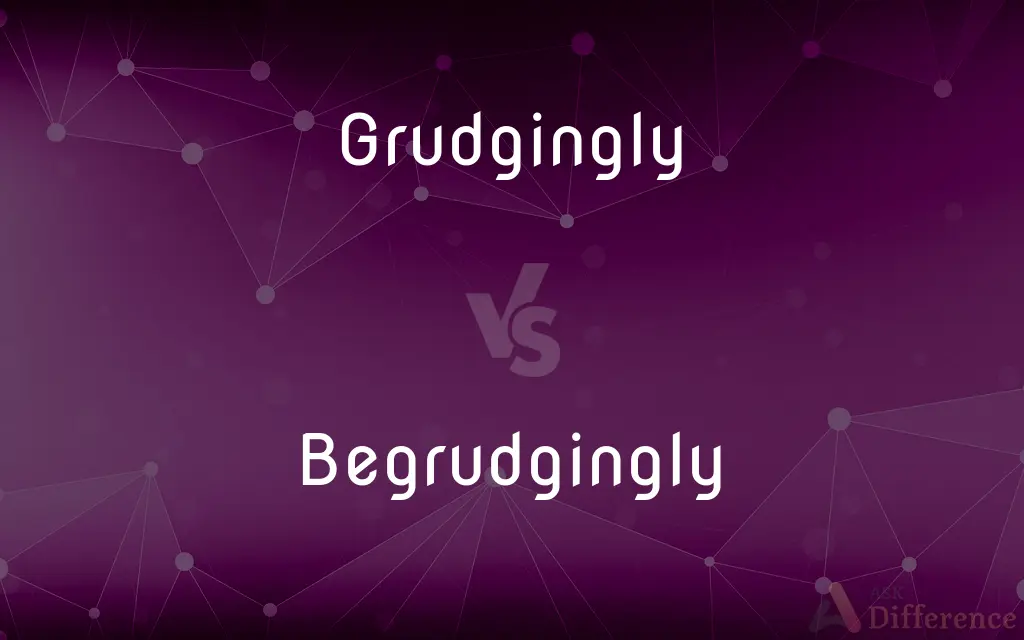Grudgingly vs. Begrudgingly — What's the Difference?
By Fiza Rafique & Urooj Arif — Updated on March 15, 2024
Grudgingly refers to doing something with reluctance or lack of enthusiasm, while begrudgingly implies doing so with envy or resentment.

Difference Between Grudgingly and Begrudgingly
Table of Contents
ADVERTISEMENT
Key Differences
Grudgingly describes an action taken with reluctance or a lack of willingness, often because the person feels compelled or obligated to do so without genuine enthusiasm. On the other hand, begrudgingly carries a nuance of envy or resentment, indicating that the person may be unwilling or reluctant because they envy someone else's success or happiness, or resent having to give something up.
When someone acts grudgingly, it is primarily about the lack of desire to perform the task itself, perhaps due to laziness, disagreement with the task's necessity, or simply preferring to do something else. Whereas acting begrudgingly suggests that the reluctance is tinted with feelings of injustice or covetousness, as if the person believes they are giving up more than they should or that someone else is undeservedly benefiting at their expense.
The emotional undertone of grudgingly is more about personal disinterest or inconvenience, focusing on the task or action itself rather than the broader implications of fairness or jealousy. In contrast, begrudgingly adds a layer of emotional complexity, indicating that the person's reluctance is not just about the task but also involves negative feelings towards another's advantage or the perceived unfairness of the situation.
In usage, grudgingly is often applied to situations where the reluctance is more benign or passive, such as agreeing to attend an event one is not interested in. Begrudgingly, however, is used in contexts where there's an active sense of resentment or envy, such as congratulating someone when feeling they did not deserve the accolade.
Despite their differences, both adverbs highlight a lack of wholeheartedness in the action, with the key distinction lying in the underlying reasons for the reluctance: personal inconvenience or disinterest versus resentment or envy.
ADVERTISEMENT
Comparison Chart
Definition
Doing something with reluctance or lack of enthusiasm
Doing something with envy or resentment
Emotional Undertone
Personal inconvenience or disinterest
Envy, resentment, or perceived unfairness
Focus
Reluctance towards the task itself
Reluctance influenced by feelings towards others or situations
Usage Context
More benign or passive reluctance
Active sense of resentment or envy
Example
Attending an event without interest
Congratulating someone while feeling they didn't deserve it
Compare with Definitions
Grudgingly
Grudgingly refers to performing an action reluctantly or without enthusiasm, often out of a sense of obligation.
He grudgingly agreed to help with the chores, preferring to do anything else.
Begrudgingly
Begrudgingly means doing something with a feeling of envy or resentment, especially in giving praise or conceding.
She begrudgingly congratulated her competitor, feeling she deserved the win.
Grudgingly
It can describe a half-hearted or minimal effort put into a task due to lack of interest.
She grudgingly completed the assignment, putting in just enough effort to pass.
Begrudgingly
It can imply a reluctance tinged with feelings of unfairness or jealousy.
He begrudgingly accepted the praise for his colleague, believing his own contributions were greater.
Grudgingly
Grudgingly also implies acquiescence under protest or discomfort.
The team grudgingly accepted the new policy, despite their reservations.
Begrudgingly
Begrudgingly can also refer to a reluctant agreement that feels unjust or undeserved.
They begrudgingly signed the agreement, feeling they were getting the short end of the stick.
Grudgingly
It can indicate reluctant agreement or consent to something seen as inevitable or necessary.
He grudgingly admitted the need for a more efficient system.
Begrudgingly
Begrudgingly describes the act of giving or yielding with resentment.
The company begrudgingly issued refunds, resentful of the financial loss.
Grudgingly
Grudgingly may express a muted form of displeasure or annoyance with a situation or requirement.
They grudgingly moved aside, annoyed at the interruption to their conversation.
Begrudgingly
It denotes a lack of generosity or goodwill in acknowledging another's success or rights.
The team begrudgingly acknowledged the rival's superior strategy.
Grudgingly
Reluctant; unwilling.
Begrudgingly
To envy (someone) the possession or enjoyment of (something)
She begrudged him his youth.
Grudgingly
In a manner expressing resentment or lack of desire.
Begrudgingly
To give or expend with reluctance
Begrudged every penny spent.
Grudgingly
In a grudging manner.
Begrudgingly
In a begrudging manner; in a manner that is envious or reluctant.
Grudgingly
In a grudging manner;
He grudgingly agreed to have a drink in a hotel close by
Common Curiosities
Can both terms be used interchangeably?
While they can sometimes be used in similar contexts, the choice between them depends on the underlying emotion: begrudgingly for situations involving envy or resentment, and grudgingly for general reluctance or disinterest.
Can an action be both grudgingly and begrudgingly done?
Yes, an action can be done both grudgingly and begrudgingly if it is performed with reluctance stemming from both personal inconvenience and resentment or envy.
Is there a difference in intensity between grudgingly and begrudgingly?
Begrudgingly often carries a stronger emotional charge due to its association with envy or resentment, while grudgingly might be milder, relating more to personal inconvenience or reluctance.
Does begrudgingly always imply jealousy?
Not always jealousy in a narrow sense, but it does imply a negative emotional response, such as resentment or a sense of unfairness, that can include jealousy.
How does context affect the use of grudgingly vs. begrudgingly?
The context—whether it's personal reluctance or resentment towards others' benefits—determines which term is more appropriate.
Can one feel begrudgingly towards an inanimate object or situation?
Typically, begrudgingly is directed towards people or their achievements, but it can be used for situations where there's a sense of personal loss or unfairness.
Can the use of grudgingly or begrudgingly impact interpersonal relationships?
Yes, expressing actions as done grudgingly or begrudgingly can affect relationships by revealing underlying feelings of reluctance, envy, or resentment.
How do grudgingly and begrudgingly relate to willingness?
Both terms indicate a lack of full willingness, but grudgingly focuses on the task itself, while begrudgingly also considers one's feelings towards others or the situation.
Is begrudgingly more personal than grudgingly?
Yes, begrudgingly often involves personal feelings towards another's success or situation, making it more emotionally charged.
How does culture influence the perception of actions done grudgingly or begrudgingly?
Cultural attitudes towards envy, public acknowledgment, and personal pride can influence how actions motivated by reluctance or resentment are viewed.
How do grudgingly and begrudgingly affect the tone of communication?
The use of either can add a tone of reluctance or negativity to communication, potentially signaling dissatisfaction or discontent.
Share Your Discovery

Previous Comparison
Astronaut vs. Cosmonaut
Next Comparison
Previous vs. PriorAuthor Spotlight
Written by
Fiza RafiqueFiza Rafique is a skilled content writer at AskDifference.com, where she meticulously refines and enhances written pieces. Drawing from her vast editorial expertise, Fiza ensures clarity, accuracy, and precision in every article. Passionate about language, she continually seeks to elevate the quality of content for readers worldwide.
Co-written by
Urooj ArifUrooj is a skilled content writer at Ask Difference, known for her exceptional ability to simplify complex topics into engaging and informative content. With a passion for research and a flair for clear, concise writing, she consistently delivers articles that resonate with our diverse audience.













































